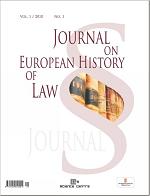„Nec facere nos posse credendum est” Ein Interpretationsversuch zur Papinian D. 28, 7, 15
„Nec facere nos posse credendum est” Interpretation of Papinian D. 28, 7, 15
Author(s): Gergely DeliSubject(s): Law, Constitution, Jurisprudence
Published by: Evropská společnost pro právní dějiny, z.s.
Keywords: Contra bonos mores; boni mores; immorality; roman law.
Summary/Abstract: The article concerns the famous Papinian fragment (D. 28, 7, 15) from Justinian’s Digest. It offers a new, alternative approach for proper understanding of the highly contested text. It argues that the condition in question has been physically possible but illegal. The problem was that illegal conditions were valid according to civil law (ius civile) of that time. However, if the condition had only been cancelled the outcome would have been strikingly unjust. Thus, the jurist making the decision wanted to refute the entire testament. For this reason he considered the condition (morally) impossible with the argument that an honest man cannot do anything against his own piety, reputation, and sense of decency.
Journal: Journal on European History of Law
- Issue Year: 3/2012
- Issue No: 2
- Page Range: 165-171
- Page Count: 7
- Language: German

